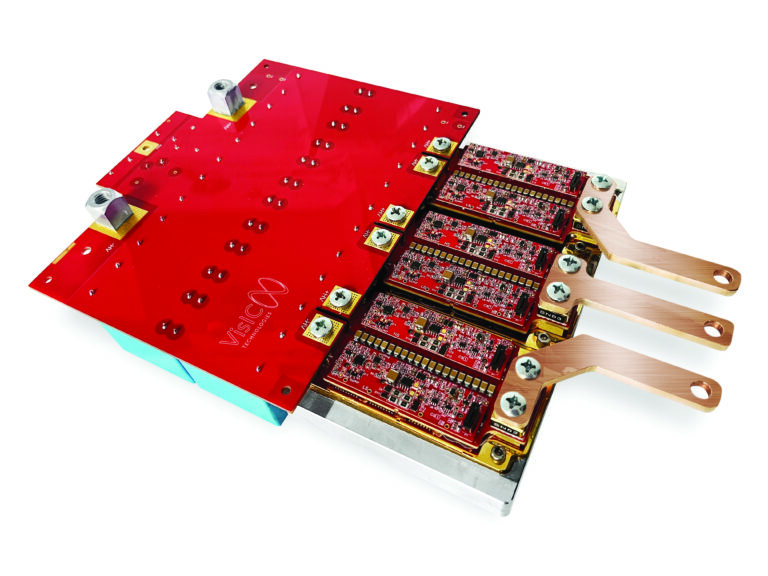Most automotive manufacturers are currently planning to deploy silicon carbide-based (SiC) traction inverters in their higher-performance EVs, as they look to capitalize on the efficiency the material brings. However, the cost of SiC is high, meaning it is not viable for use in more mass-market offerings. Enter gallium nitride (GaN), another wide bandgap material that promises SiC levels of efficiency at far lower cost. To date, GaN semiconductors have been limited to low-power applications. Now, thanks to the efforts of Israeli firm VisIC Technologies, GaN could soon make its way into mainstream automotive traction inverters, with the company announcing it has successfully tested a reference design traction inverter with a European OEM.
Explaining the make-up of its traction motor inverter, Ran Klier, SVP of global sales and marketing at VisIC Technologies, said, “Our first three-phase inverter reference design is assembled from three VM022 (formerly VM800) power module sets. Each VM022 is a half-bridge inverter, used for driving each phase’s current, containing four of our V08 8mΩ FETs in parallel for both the high side and the low side.
“The RDS(on) of each inverter phase module is 2.2mΩ. The VisIC Technologies D³ (Direct Drive D-mode) GaN-based devices are rated for 650V, making this inverter ideal for common, low-cost 400V EV batteries, giving better performance than SiC, which implies high inverter and motor efficiencies, and all at an attractive cost level, similar to existing economical Si IGBT solutions.”
The inverter prototype, including its driving circuitry, embedded sensors and coolant circuit, was installed on a dyno test bench at a reputable European OEM’s lab and connected to an automotive-grade permanent magnet synchronous motor (PMSM).
Measurements of each phase’s output voltage and current were taken close (approximately 250mm) to the inverter and motor. According to Klier, the test results exceeded expectations: “The phase current reached 350Arms (500A peak) at 400V, although test system setup limitations prevented higher currents, which the 2.2mΩ Power Module is capable of. Concerns about parallelization and oscillations caused by fast-switching transients of multiple GaN FETs have been addressed. “The European OEM with whom the testing was carried out confirmed that the results achieved, including in a WLTP driving cycle, were comparable with the latest highest-performance SiC-based inverters.”
Detailing the test process, Klier explains that after verifying the motor control accuracy of the first GaN inverter on the test bench, the input and output voltages were gradually increased, as well as the current, up to the maximum level set for the test. Following this, a drive cycle test was performed with measurement of the inverter phase current and motor torque versus measured efficiency for complete benchmarking.
“We showed that our GaN technology could reach high efficiency with low inductive and switching losses, suitable for both full-load and light-load driving modes,” said Klier. “Beyond that, the main achievement of the test was proving the high-voltage and high-power capabilities of VisIC’s D³ GaN technology, which provides the efficient switching of the direct drive of the GaN gate with the high gate reliability of the D-mode [depletion mode] GaN, which is crucial for automotive.”
VisIC Technologies has partnerships with several automotive Tier 1 and OEM companies, developing next-generation traction inverters based on D³ GaN semiconductor dies and modules. These inverters are expected to reach serial production within the next three to four years. In parallel, the company is also partnering with supply chain leaders. “This will ensure that the first GaN-based transistors used in automotive inverters reach the optimal price level and achieve a low CO2 footprint by using GaN-on-silicon technology,” said Klier.
“That means we can address supply chain concerns by using existing high-volume semiconductor production lines, which can scale from 150 to 200mm and up to 300mm on the existing cost basis for silicon material.”



